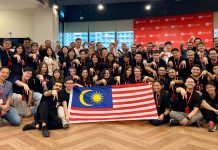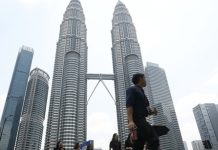Highlights:
- EMR system to be implemented at 145 hospitals within next three years
- Low salary, lack of skills and migration among reasons for urban poverty
- Amazon Kicks Off the Holiday Season via Prime Now
- Your digital identity could be on sale for less than $50
- Inbound Tourism Fuels Future-Ready Cities Across Southeast Asia
EMR system to be implemented at 145 hospitals within next three years
The electronic medical record (EMR) system which facilitates the transfer and sharing of patient information is expected to be implemented at 145 hospitals nationwide within the next three years. Health Minister Datuk Seri Dr Dzulkefly Ahmad said the new technology would facilitate medical practitioners including doctors and nurses to identify and share patients’ medical consultation information as well as prescription of medicines through an integrated system. “Through this system, a patient can arrive at any hospital, in any state, accessibility can be reached, and if necessary, referral to any specialist hospital, and all (medical information) can be accessed and disseminated through the EMR system.
Low salary, lack of skills and migration among reasons for urban poverty
Low household income, lack of skills and the increased migration of rural folk and foreign workers have been identified as among the reasons for the rise in urban poverty. Federal Territories Minister Khalid Abdul Samad said this group struggled to cope with living in cities despite earning salaries exceeding the country’s poverty line and minimum wage. “A UNICEF report, which conducted a study of 17 low-cost housing areas found that nine out of 10 breadwinners had semi-skilled or low-skilled jobs,” he said, referring to the ‘Children Without: A study of urban child poverty and deprivation”, study commissioned by UNICEF.
Amazon Kicks Off the Holiday Season via Prime Now
Amazon today announced the kick off of the holiday shopping season for Amazon Prime members in Singapore, offering thousands of deals across its local and international selection. Beginning tomorrow with the 11.11 deal event, the Prime Now App will feature deals on everything from toys and electronics to beauty products and holiday entertaining essentials, including kitchen items and holiday décor — all in one convenient location. New this holiday season, Prime members will be able to take advantage of hundreds of deals on best-selling items imported from Amazon US and delivered locally via Prime Now with free two-hour delivery on orders of S$40 or more. In addition, Prime members will also be able to shop thousands of holiday deals on international selection via the Prime Now App with free delivery in 7-9 business days on orders of S$60 or more.
Your digital identity could be on sale for less than $50
A new study from Kaspersky Lab has revealed that while our identity may not be worth a lot in terms of dollars, it is a significant asset to criminals in other ways. The research uncovered an appetite among cybercriminals for data stolen from popular services – including via social media accounts and remote access to gaming websites. User confusion about what their data is worth could result in a haphazard approach to security, making it all too easy for thieves to steal data and commit crime. Data stolen due to people’s lax security may have limited resale value, but can be put to many uses. This can cause huge problems for an individual victim, who may lose money and their reputation, find themselves being chased for debt that somebody else has incurred in their name, or even suspected of a crime that somebody else has committed using their identity as a cover. Kaspersky Lab investigated Dark Web markets to find out how much personal data is worth, and how it is used by criminals. The company’s researchers found that criminals can sell someone’s complete digital life for less than $50; including data from stolen social media accounts, banking details, remote access to servers or desktops, and even data from popular services like Uber, Netflix, and Spotify, as well as gaming websites, dating apps, and porn websites which might store credit card information. Meanwhile, researchers found that the price paid for a single hacked account is lower, with most selling for about $1 per account, and with criminals offering up discounts for bulk-buying.
Inbound Tourism Fuels Future-Ready Cities Across Southeast Asia
Mastercard today unveiled a report that demonstrates the transformative power of tourism in fuelling the development of smarter cities and accelerating economic growth. “The ASEAN Opportunity: How City Planners and Governments Can Make Cities Even Smarter by Increasing Investments in Inbound Tourism Growth” explores how cities can leverage public-private partnerships and data analytics to optimally allocate resources to grow inbound tourism. Specifically, the report demonstrates how cities can leverage insights from anonymized and aggregated Mastercard transaction data to better reach and attract key traveller segments. Such strategic investments in inbound tourism growth will in turn deliver a higher standard of living for residents, create greater financial inclusion and jump-start economic development. With urbanization comes many benefits, including a larger workforce, higher demand for goods and services as well as increases in tourism-related inbound income, which in turn leads to a rise in GDP, as seen in Vietnam, Malaysia, and others in the region. At the same time, urbanization brings new challenges. As cities reach critical mass, growing populations mean rising demand for jobs and resources and increased pressure on healthcare, education and transportation systems. “No one entity can solve for these challenges by themselves, and Mastercard believes strategic public-private partnerships can bring rapid improvements to quality of life, deliver efficient and seamless everyday experiences and create differentiation specifically in a high visibility and high growth area such as tourism,” said Rupert Naylor, Senior Vice President of Mastercard Advisors in Asia Pacific. A key contributor to the impressive economic growth of Southeast Asia over the last decade is the even faster growth in inbound travel spend, driven both by major tourist destinations as well as by lesser-known locales. For example, while Bangkok, Singapore and Kuala Lumpur continue to top the list for most international arrivals, Vietnamese cities Hanoi and Ho Chi Minh have risen rapidly and cracked the top 10 list this year. Phuket, Pattaya, and Chiang Mai—destinations in Thailand—have also grown in popularity, suggesting travellers are becoming more experiential and open to trying new destinations. This growing volume of visitors to lesser-known destinations reveals how governments can invest in up-and-coming destinations so as to more equitably spread the benefits (and strains) of tourism throughout the country. However, to realize the full potential of this strategy, investments in infrastructure for these lesser-known destinations will be critical, both in terms of connectivity to these locations, but also within the destinations themselves—including cleanup of public spaces, improved access to clean water, more efficient public transportation and greater financial inclusion for merchants in these cities.
























